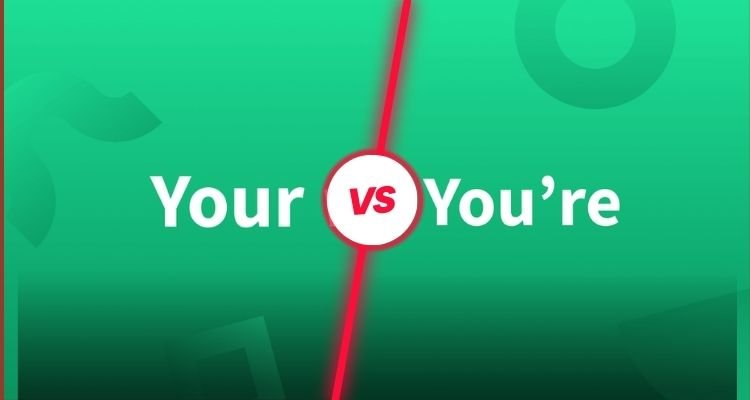In English grammar, homophones like your and you’re can often be confusing because they sound identical but have different meanings and uses. Understanding the difference between your and you’re is essential for proper grammar and clear communication in writing.
Definition of Your
Your is a possessive adjective used to indicate ownership or association. It describes something that belongs to or is related to the person (or people) being addressed.
- Key Characteristics:
- Usage: “Your” is used before a noun to show possession or a relationship with the person being spoken to.
- Function: It functions similarly to other possessive adjectives like “my,” “his,” “her,” “its,” “our,” and “their.”
- Examples:
- “Is this your book?” (Indicates the book belongs to the person being addressed)
- “Remember to bring your keys.” (Indicates the keys belong to the person being addressed)
- “I love your idea!” (Indicates the idea belongs to or is related to the person being addressed)
Definition of You’re
You’re is a contraction of the words “you are.” It is used to indicate a state of being or to describe the person (or people) being addressed.
- Key Characteristics:
- Usage: “You’re” is used in sentences where “you are” would also be appropriate. It combines the pronoun “you” and the verb “are” into a single, shorter word.
- Function: It functions as the subject and verb of a sentence or clause.
- Examples:
- “You’re going to be late if you don’t hurry.” (Short for “You are going to be late”)
- “I think you’re doing a great job.” (Short for “You are doing a great job”)
- “You’re the best friend anyone could ask for.” (Short for “You are the best friend”)
Core Differences
Part of Speech
- Your: A possessive adjective that shows ownership or relation.
- You’re: A contraction of the pronoun “you” and the verb “are.”
Function in a Sentence
- Your: Modifies a noun to indicate possession or relationship. It does not stand alone and always needs to be followed by a noun.
- You’re: Serves as the subject (“you”) and the verb (“are”) in a sentence, making a complete statement on its own.
Usage Examples
- Your: “Is this your coat?” (Shows ownership of the coat)
- You’re: “You’re very kind.” (Short for “You are very kind”)
Core Similarities
Pronunciation
Both “your” and “you’re” are pronounced the same way, which can lead to confusion in writing since they are homophones.
Role in Addressing the Reader
Both words directly address the reader or listener, often involving the second person “you.”
Comparison Table
| Feature | Your | You’re |
|---|---|---|
| Part of Speech | Possessive adjective | Contraction of “you are” |
| Function | Shows ownership or relationship | Indicates a state of being or description |
| Usage Example | “Your car is outside.” | “You’re welcome to join us.” |
| Pronunciation | Sounds like “you’re” | Sounds like “your” |
Pros and Cons
Your
- Pros:
- Clearly shows possession or relation in a sentence, making it easy to indicate ownership.
- Commonly used in everyday language, making it familiar to most speakers.
- Cons:
- Can be easily confused with “you’re” due to similar pronunciation, leading to common grammatical errors.
You’re
- Pros:
- Provides a concise way to combine “you are” into a single word, making writing more efficient.
- Easy to use in sentences that describe a state of being or action.
- Cons:
- Frequently confused with “your,” especially in writing, due to identical pronunciation.
Use Cases and Scenarios
When to Use Your
- Showing Ownership: Use “your” when you want to indicate that something belongs to or is associated with the person being spoken to.
- Example: “Don’t forget your umbrella.”
When to Use You’re
- Indicating a State of Being: Use “you’re” when you need to combine “you are” to describe an action, state, or quality of the person being addressed.
- Example: “You’re going to love this movie.”
Summary
In summary, the main difference between “your” and “you’re” lies in their grammatical roles and meanings. “Your” is a possessive adjective used to show ownership or association, while “you’re” is a contraction of “you are,” used to describe a state of being or action. Although they sound the same, their proper usage depends on the context of the sentence. Understanding these differences helps avoid common grammatical mistakes in writing.
FAQs
Q: Can “your” and “you’re” be used interchangeably?
A: No, “your” and “you’re” cannot be used interchangeably. They serve different grammatical functions and have different meanings.
Q: How can I remember the difference between “your” and “you’re”?
A: A helpful tip is to remember that “you’re” is short for “you are.” If you can replace “you’re” with “you are” and the sentence still makes sense, then “you’re” is the correct choice.
Q: Why do people often confuse “your” and “you’re”?
A: People often confuse “your” and “you’re” because they sound the same (homophones) but have different meanings and uses. This confusion is common, especially in casual writing or typing.
Q: Can “your” be used to refer to inanimate objects?
A: Yes, “your” can refer to ownership or association with both animate and inanimate objects, such as “your phone” or “your idea.”
Q: Is “you’re” ever used in formal writing?
A: Yes, “you’re” can be used in formal writing when appropriate, but it’s more commonly seen in informal contexts. In formal writing, some prefer to use “you are” to avoid contractions.

